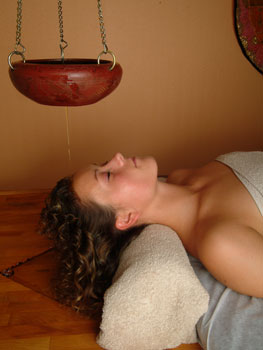 瑜伽理療是把瑜伽的方法運用在治療方面。瑜伽理療和阿育吠陀是姊妹學科。
瑜伽理療是把瑜伽的方法運用在治療方面。瑜伽理療和阿育吠陀是姊妹學科。阿育吠陀是吠陀(Ayurveda)的學科,它提供健康和疾病理論上的闡解。它同樣給我們練習的建議,如何保持健康和治療疾病,使得達到健康長壽。阿育吠陀的理論使我們理解如何和為什麼運用瑜伽的方法進行治療。
瑜伽沒有有關健康和疾病的理論。瑜伽從來不是一種完全的治療體系。與其說瑜伽給我們提供一種身體強有力的方法技術和方法,不如說是我們可以運用它從根本上改善我們的健康,預防疾病和控制和治療疾病。
瑜伽是身心的健康一種實踐的科學,是契入心靈體驗(spiritual experience)一種實踐的科學,心靈體驗是我們身體整體健康的一個重要部分。瑜伽可以拓展我們的認知,讓我們非常清晰地認識什麼至是我們所需要的,給我們提供達到我們所需要的方法和手段。
認知的提高讓我們"感知"到身心將會發生什麼。健康是知覺擴展的次要效用,它使我們能夠恰到好處地改善我們的健康,讓我們的身心越來越健康。 瑜伽是一種體驗的科學,它可以提供給我們探索生命所有方面的方法,包括喜悅與痛苦,健康與疾病,生存與死亡,以及超越所有這些的狀態。這樣,我們可以通過我們自己個體的體驗發現我們固有的、真正的自我。

最重要的是,瑜伽理療轉變我們對於疾病和痛苦的體驗,這樣它們可以成為我們心靈旅程的一部分,成為一種心靈淨化與提升,獲得智慧的方法和手段。瑜伽坦特羅(Yoga-Tantra)讓我們通過生命所有的體驗找到生命的意義和目的所在,並使之圓滿完成和最終實現。
-------------------------------------------------------------------------
本文譯自國外的資料,供大家研究學習瑜伽之用,文中的觀點僅供參考。
NOTE:
1.轉載自
http://www.yogiyogacenter.com/bbs/Announce/Announce.asp?BoardID=22&ID=41771
yogic
2.另放一篇Yoga Journal文章,給大家參考
http://www.yogajournal.com/basics/1381
Yoga vs. Yoga Therapy
Not every yoga class is appropriate for students with injuries. Those students with special needs should instead try yoga therapy.
By Timothy McCall, M.D.
In 1998, the Journal of the American Medical Association (JAMA) reported that an eight-week yoga program had positive results for people with carpal tunnel syndrome. These promising results got a lot of publicity, sparking interest among the general public and health care professionals about yoga's potential as a therapeutic modality. After hearing about such a study, many peoplencluding doctorsight believe they can walk into any yoga class with a medical malady and be healed. But the fact is, if someone with carpal tunnel syndrome shows up at a hatha yoga class that includes poses that are weight-bearing on the hands and wrists (think Plank, Upward-Facing Dog, and Handstand), they could easily wind up worse than when they started. So, while such studies help raise awareness about yoga, it's crucial that we discern the difference between a typical yoga class and yoga therapy.
In the JAMA study, one of the key components that led to the positive results is that senior Iyengar teacher Marian Garfinkel carefully designed a therapeutic yoga program tailored to the specific needs of carpal tunnel patients and, when necessary, adapted it to the individuals in the group. There are exceptions, but for the most part, this kind of personalization is rarely possible in a class setting.
Yoga therapy is typically conducted one-on-one or in small groups. Often, a session more closely resembles an appointment with a physical therapist or rehabilitation specialist than it does a typical yoga class. What sets this healing modality apart from others is the focus on linking movement to deep, rhythmic breathing. Another difference is the emphasis on relaxation. In fact, when someone is gravely ill, a therapist may suggest that the entire practice consist only of breath awareness and relaxation until the patient is ready to tackle more.
If you're looking for a yoga therapist, it's important to be aware that there are many different kinds from a wide variety of yoga traditions and, as of yet, there is no universally accepted certification system. So, the type of training and number of hours a therapist has studied varies from person to person. For this reason, word of mouth is still an effective way to find the right yoga therapistsk around or call yoga studios for leads. Here are some specific qualities to look for.
APPROPRIATE TRAINING.
If you have a condition that requires knowledge of the physical body, like back pain or arthritis, find someone with substantial anatomy training. If you have a more serious medical conditionuch as cancer, heart disease, or lupusou'll need a therapist who understands the disease, the effects of medications, and contraindications to practicing. Look for someone who has sought additional training in your specific condition or who has a background in a health care profession, like nursing or physical therapy.
EXPERIENCE.
Ask potential therapists how long they've been practicing yoga therapy and how often they have worked with people who have your condition. As with most anything, the more experience someone has, the more equipped he or she will be to help you.
AN ACTIVE YOGA PRACITCE.
An effective yoga therapist must have this.
AN INSPIRING APPROACH.
A good yoga therapist is knowledgeable, but a great one will be able to design a personalized program that motivates you to practice on your own. The key to success in yoga therapy is to feel connected to your own healing.
Timothy McCall is Yoga Journal's medical editor. To suggest ideas for future columns, e-mail him at drmccall@yogajournal.com. You can also find him through his Web site, www.drmccall.com.
沒有留言:
張貼留言